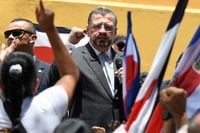On September 22, 2025, Costa Rica’s political landscape was shaken by a historic congressional vote that could have stripped President Rodrigo Chaves of his legal immunity and exposed him to prosecution on corruption charges. The attempt, however, fell short, leaving the 64-year-old leader in office and the nation’s democratic norms under the microscope as the 2026 general election looms.
The vote, held in the unicameral Legislative Assembly, was the first of its kind in Costa Rican history. According to the Associated Press, lawmakers debated whether to remove a sitting president’s immunity—a move never before attempted in the Central American nation. Prosecutors had accused Chaves of abuse of power, specifically that he pressured a video producer, who had been awarded a contract by the Central American Bank for Economic Integration, to funnel $32,000 to his friend and former adviser, Federico Cruz, known as Choreco. The funds allegedly traveled through a questionable arrangement involving a communications firm linked to the presidency.
Despite the gravity of the allegations, the vote did not reach the required threshold. As reported by AFP and WRAL, thirty-four lawmakers voted in favor of removing Chaves’ immunity, while 21 opposed the measure and two were absent. The law required a supermajority—38 of 57 deputies—to proceed. Falling four votes short, the effort failed, allowing Chaves to remain shielded from prosecution for the remainder of his term, which ends in May 2026.
The proceedings were set in motion earlier in 2025, when the Supreme Court and a legislative panel of three lawmakers gave their approval for the case to advance to the full Assembly. This legal green light was itself a significant step, reflecting the seriousness with which the allegations were treated at the highest levels of government. If the vote had succeeded, the Supreme Court would have presided over Chaves’ trial.
In a striking contrast to Chaves’ approach, Culture Minister Jorge Rodríguez, who faced similar charges in the case, voluntarily gave up his own immunity, choosing to face trial directly. This move drew attention to the divergent responses within the administration to the unfolding scandal.
President Chaves, who came to power in 2022 after a career at the World Bank, has often clashed with Costa Rica’s courts, lawmakers, prosecutors, and the press. According to AFP, he refused to attend the September 22 debate, dismissing the process as a “rigged show” designed to undermine his authority. “I will not dignify this farce with my presence,” he declared last week, making his position clear to both supporters and critics.
The debate inside the Assembly was charged and, at times, deeply divided. Three lawmakers presented their findings after reviewing the case. Two argued in favor of removing Chaves’ immunity, insisting that the evidence was solid and that failure to act would erode the foundations of Costa Rica’s democratic system. The third lawmaker countered, describing the allegations as flimsy and politically motivated, lacking substantive proof.
Chaves’ Social Democratic Progress Party, along with some opposition lawmakers, opposed the move, ensuring the effort would not reach the supermajority needed. The outcome was viewed by many as a political victory for Chaves and his party in the run-up to the 2026 general election. As AFP noted, “The vote was a political victory for Chaves’ party ahead of the 2026 general election.”
Observers and experts provided mixed reactions. One political analyst described the failed attempt as a setback for democratic norms, warning that accountability must not be allowed to slip away. Another emphasized that the process itself demonstrated the resilience of Costa Rica’s institutions and that the investigation into Chaves’ conduct would continue once he leaves office. The prosecutor’s office has confirmed that their probe remains active and will intensify after his term concludes.
The failed vote has significant implications for Costa Rica’s immediate future. As reported by AP, if Chaves had lost his immunity, he would have faced trial while still president—a scenario that could have upended the nation’s political stability. Instead, he remains in office, free to pursue his agenda as the country grapples with economic challenges, including rising living costs and shifting job markets. Chaves has championed reforms in education, security, and infrastructure, and has been credited with efforts to revive Costa Rica’s vital tourism sector after the global health crisis. These initiatives have drawn both praise and criticism, reflecting a sharply divided public opinion.
Meanwhile, the political maneuvering is far from over. Laura Fernández, the Social Democratic Progress Party’s candidate for the 2026 election, has already announced her intention to include Chaves in her cabinet should she win. This move could potentially extend his immunity for another four years, a development likely to spark further debate about accountability and the rule of law in Costa Rica.
For many Costa Ricans, the outcome of the vote may not have immediate, tangible effects—especially for those living in tourist hubs like Guanacaste or the capital, San Jose. However, as AFP pointed out, the episode puts the country’s commitment to fair play and democratic principles to the test. With elections just around the corner, voters are left to weigh the actions of their leaders and the strength of their institutions.
Chaves’ response to the crisis has been to double down on his core message. He continues to frame the investigation as a politically motivated attack, designed to derail his reform agenda and energize his base. “I am the victim of a politically motivated prosecution,” he has repeatedly asserted, maintaining his innocence and vowing to see his term through to the end.
The failed effort to lift Chaves’ immunity is not the end of the story. The prosecutor’s office has made it clear that their investigation is ongoing and will resume with full force once Chaves is no longer protected by presidential immunity. The episode has set a precedent in Costa Rican politics, raising questions about the balance of power, the reach of the law, and the resilience of democratic norms in the face of political turbulence.
As Costa Rica looks ahead to the 2026 general election, the events of September 22 will likely remain fresh in the minds of voters and politicians alike. The failed vote has left President Chaves in office, but it has also underscored the challenges facing the country’s democratic institutions—and the ongoing struggle to ensure that no one, not even the president, is above the law.


